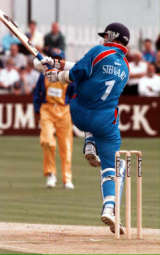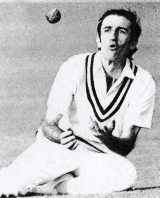Teams that didn't turn up
England's humiliating exit from the World Cup adds their name to the list of major nations who have had a tournament to forget
|
|

|
Before the tournament the question was, were India a team of great players capable of a final hurrah, or a team of has-beens past their sell-by date? The answer quickly became clear. Against a young and vibrant Bangladesh side they went down by five wickets in Trinidad, in an instant turning the World Cup on its head. Their future came down to beating Sri Lanka in the final group match. With billions of eyes watching them around the world, Rahul Dravid and Greg Chappell spoke of the belief that their team would handle the pressure - few believed them. There appeared little enjoyment in their cricket and they were duly outfoxed by Muttiah Muralitharan. The fall-out was almost instant and a series of high-powered meetings were held in Mumbai. Chappell said he wouldn't seek a contract renewal - jumping before being pushed - but Dravid retained his job ... for the time being. The future of those other once great players, though, is still far from certain.
It seemed so simple, it was written down in black and white on a piece of paper in Mark Boucher's pocket, yet still South Africa messed up. As the rain pelted Kingsmead, Boucher and Lance Klusener were keeping the home nation's World Cup dream alive. Boucher ensured South Africa were in touching distance of the Duckworth-Lewis par score if the match was abandoned, in fact a six off Muttiah Muralitharan brought them level. Wisden reported: "He pumped his right fist, believing the job done." Alas, it wasn't. Equal with the D-L target meant a tie, not enough for South Africa to progress, so as Boucher and Klusener walked off in the downpour their World Cup hopes were washed away with them. However, they didn't deserve to progress, weighed down by the pressure of expectation after early defeats to West Indies and New Zealand left them floundering.
|
|

|
Four years after being the finalists in England, Pakistan exited in the first round with a whimper. They opened their tournament against Australia at the Wanderers, and had the World Champions on the rack at 86 for 4. But Andrew Symonds slammed a destructive 143 and things went dramatically downhill from there. Following the match, Adam Gilchrist launched a racial abuse case against Rashid Latif, which was subsequently turned down by Clive Lloyd, the match referee, but Pakistan's minds were anywhere but cricket. They didn't really have to be switched on to beat Namibia and Holland, but millions of hearts were broken when they were comprehensively beaten by India in their first meeting since June 2000. The end, when it came, was suitably drab; a washed-out match against Zimbabwe at Harare consigned Pakistan to an early exit. Inzamam-ul-Haq ended the tournament with 19 runs and, predictably, Waqar Younis was replaced as captain.
The pinch-hitting frolics which Sri Lanka used to such great effect in the previous cup in 1996 had gone. In their place stood bowlers, licking their lips at the greener, more friendly conditions. Sri Lanka just couldn't cope. England eased past them in the traditional hosts-versus-holders curtain raiser at Lord's and South Africa routed them for 110 in their second match at Northampton. Not even Sanath Jayasuriya, the hero of their 1996 campaign, could adjust to the new environment, limping out of the tournament with just 82 runs in five matches. Arjuna Ranatunga, the captain and once a hero, was sacked and Sri Lanka were left wondering what might have been.
The fourth World Cup to be held in England, the hosts were soon handing round the cucumber sandwiches at their own party. A feeble fireworks display, in the rain, for the opening ceremony was a portent of gloom for their own tournament hopes, as well as those of the organisers, as they hobbled out of the Cup before the second stage - paying the price for not showing attention to net run-rate in earlier matches. They began encouragingly, beating the holders, Sri Lanka, comfortably in their opening game at Lord's by eight wickets, and followed it with easy wins over Kenya and Zimbabwe. But South Africa reconfirmed England's ineptitude with a crushing 122-run win before India knocked them out at Edgbaston. Sixteen days into a tournament which, it had been hoped, would reintroduce cricket to a disconsolate public, England were out.
|
|

|
England arrived in complete disarray, straight from South Africa where they had been annihilated 6-1 in a bloated one-day series, which was just about the last thing they needed right before a World Cup. Tired and with morale at rock bottom, they limped through the group stages, qualifying for the last eight courtesy of wins over Netherlands and UAE - that they weren't home on the first flight out of town was more thanks to a skewed format than any ability. Few expected them to do much in the quarter-final against a buoyant Sri Lanka, and they didn't disappoint, failing to grasp innovations as wholeheartedly as the eventual winners had embraced them, losing by five wickets with almost ten overs to spare. "Every single person involved in their on-field performance on this tour should now consider his position," fumed The Daily Telegraph.
The first southern hemisphere tournament and Australia, with their experience in one-day cricket, were the red-hot favourites. But under pressure, they cracked, losing the opening game in New Zealand and being undone for the final time by Ian Botham who took 4 for 31 and made 53 not out as England won by eight wickets. The home side exited with four wins in eight, edged out by Pakistan whose one point for the rain-ruined abandonment against England, when they had been bowled out for 74, carried them into the semi-finals. By then the public were almost ignoring the tournament, as was the country's television.
Two time winners and finalists in all three previous events, West Indies were at the height of their powers in 1987 and were one of the favourites. They lost their opening match against England by two runs, but that seemed little more than a hiccup as they bounced back by thrashing Sri Lanka. They slipped up to Pakistan by one wicket and, needing to beat England in the rematch to stay in the competition, they reached 208 for 4 but ran out of overs and wickets as they went down by 34 runs. Not even a semi-final for the triple finalists.
|
|

|
The beaten finalists in 1975 were handicapped by the omission of all the players contracted to Kerry Packer's World Series Cricket, a controversial and self-harming move by the Australian board. As a result, the squad was a mixture of the raw and the not very good. Against England at Lord's they limped to a dire 159 for 9 in 60 overs, and then got thumped by Pakistan as they again failed to pass 200. Their win against Canada was not even a consolation.
On paper, Australia were a decent side. The reality was that they were bitterly divided by the legacy of Packer, and also by the captaincy of Kim Hughes, while some odd selections only added to the sense of shambles. Their campaign could not have got off to a worse start as they lost to World Cup newcomers Zimbabwe, still almost a decade away from being awarded Test status, and then got hammered by West Indies two days later. They beat eventual winners India, but crashed out after being thrashed for a second time by West Indies and then by India in the return game. Six matches, two wins, and an early trip home.
The inaugural World Cup was something of a lottery in that so little international one-day cricket had been played that nobody could claim to be experts at it. Nevertheless, the traditional powerhouses were expected to come to the fore. The group structure meant that two out of England, India and New Zealand would go through, and on the eve of the tournament The Times tipped them for the semi-finals, adding their spinners, especially Bishen Bedi, could be the stars. Bedi was outstanding - his 24 overs yielded 2 for 34 - but the batting let them down against England and New Zealand. The opening game at Lord's was particularly grim, India making 132 for 3 in 60 overs chasing 335. Sunil Gavaskar entered the Hall of Shame for scoring 36 not out through the entire turgid affair.
Martin Williamson is managing editor of Cricinfo, Andrew McGlashan and Will Luke are staff writers